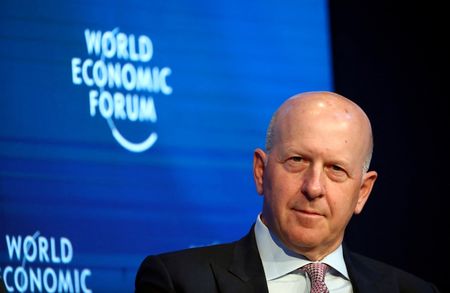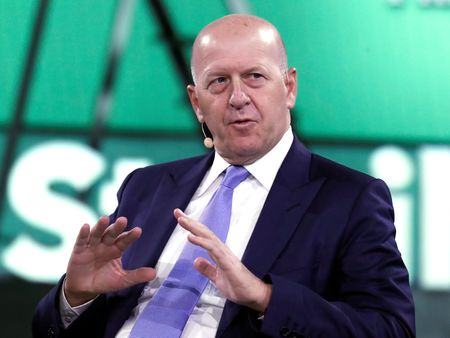By Lananh Nguyen and Saeed Azhar
NEW YORK (Reuters) -To listen to Goldman Sachs Group Inc Chief Executive David Solomon, the bank is doing “great,” while skeptical investors wonder what comes next.
Days after Goldman reported disappointing profits that sent shares tumbling 6%, and months after it stepped back from a money-losing foray into Main Street banking, Solomon sat for an interview with Reuters in Davos, Switzerland where he highlighted the firm’s hits — and downplayed its misses.
“Good companies should invest and innovate and try new things. And by the way, when you do, you’re not going to always get it right,” Solomon said at the World Economic Forum’s annual gathering last week.
He then reeled off Goldman’s growth numbers: average revenues up 44% over a three-year period, a 39% jump in book value per share since 2019 that outpaced peers and a bigger dividend than rivals.
The company is being “prudent” on expenses by laying off thousands, Solomon said. It will also shed some of the $59 billion of alternative investments that weighed on earnings.
But shareholders want to know more about the Wall Street giant’s plans after results fell short of expectations and one unit lost $3 billion over three years.
Solomon offered few specifics on future strategy, but those details may come at the company’s investor meeting on Feb. 28 in New York.
“Investors remain skeptical,” said Joe Rava, an equity analyst at abrdn, which owns shares in the bank.
David Konrad of Keefe, Bruyette & Woods was one of several analysts who recently cut Goldman’s share price target, noting that it suffered from “a perfect storm of declining revenues in a challenging market.”
And for UBS analyst Brennan Hawken, who rates Goldman at neutral, the idea of buying the stock on expectations of a higher price-to-earnings ratio “is really, really hard right now.”
Still, Goldman shares are up 3.6% over the past year, outperforming the S&P 500 banking index and peers.
Since taking the helm in 2018, Solomon has tried to diversify Goldman beyond its traditional powerhouses of trading — which languished after the 2008 financial crisis — and investment banking. But those divisions have become even more dominant, comprising 69% of the firm’s revenue at the end of last year, versus 58% the year Solomon took over.
The CEO also championed Marcus, a retail banking business that faltered even as it attracted more than $100 billion in deposits.
The company slashed Solomon’s pay by 29% to $25 million for 2022. It cited a “challenging operating environment,” but also noted his “effective leadership,” according to a filing.
Goldman’s moves into consumer lending and transaction banking were “head scratchers,” said Kush Goel, senior research analyst at asset manager Neuberger Berman, which owns the bank’s stock. Instead, it should have followed rival Morgan Stanley, which earns a steady stream of income from wealth-management fees, he said.
Goldman’s asset and wealth management unit generated 34% of its revenue in the fourth quarter, while Morgan Stanley derived 63% of its revenue from comparable divisions.
“Goldman Sachs has set a very clear strategic direction,” said Tony Fratto, a company spokesman. The bank “is making strong progress on that vision” by bringing in greater fees from asset and wealth management, maximizing its position in banking and markets, and seeking pretax profits for platform solutions, he said.
Goldman’s strengths in dealmaking and trading also make it more vulnerable to economic and market volatility than competitors, said Hawken at UBS.
Solomon, who rose to the top job from investment banking, said that division is “doing great,” despite fees falling 48% last year as deals dried up. “There’s no capital markets opportunity — that’s not permanent,” Solomon said.
In October, Goldman scaled back ambitions for Marcus by placing it under the newly-merged asset and wealth division. It also swept parts of the business into a new unit called platform solutions, which houses transaction banking, credit cards and financial technology.
While platform solutions made up only 3% of Goldman’s revenue, it accounted for about 64% of the $2.72 billion the bank set aside last year for potential credit losses. The company said it was required to boost provisions to meet accounting standards.
David Wagner, a portfolio manager at Aptus Capital Advisors, said “investors will probably need some hand holding” to see the path to greater profits.
Jim Lebenthal, a partner at Cerity Partners who manages client portfolios including shares of the Wall Street behemoth, said it should play to its strengths.
“Going back to what has made Goldman great for decades will allow the firm to reset and recover,” he said.
(Reporting by Lananh Nguyen and Saeed Azhar; Additional reporting by Niket Nishant and Paritosh Bansal; Editing by Anna Driver)


